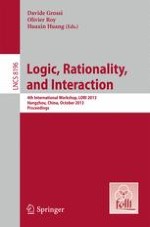This book collects the papers presented at the 4th International Workshop on Logic, Rationality and Interaction/ (LORI-4), held in October 2013 at the /Center for the Study of Language and Cognition, Zhejiang University, Hangzhou, China. LORI is a series that brings together researchers from a variety of logic-related fields: Game and Decision Theory, Philosophy, Linguistics, Computer Science and AI. This year had a special emphasis on Norms and Argumentation. Out of 42 submissions, 23 full papers and 11 short contributions have been selected through peer-review for inclusion in the workshop program and in this volume. The quality and diversity of these contributions witnesses a lively, fast-growing, and interdisciplinary community working at the intersection of logic and rational interaction.
